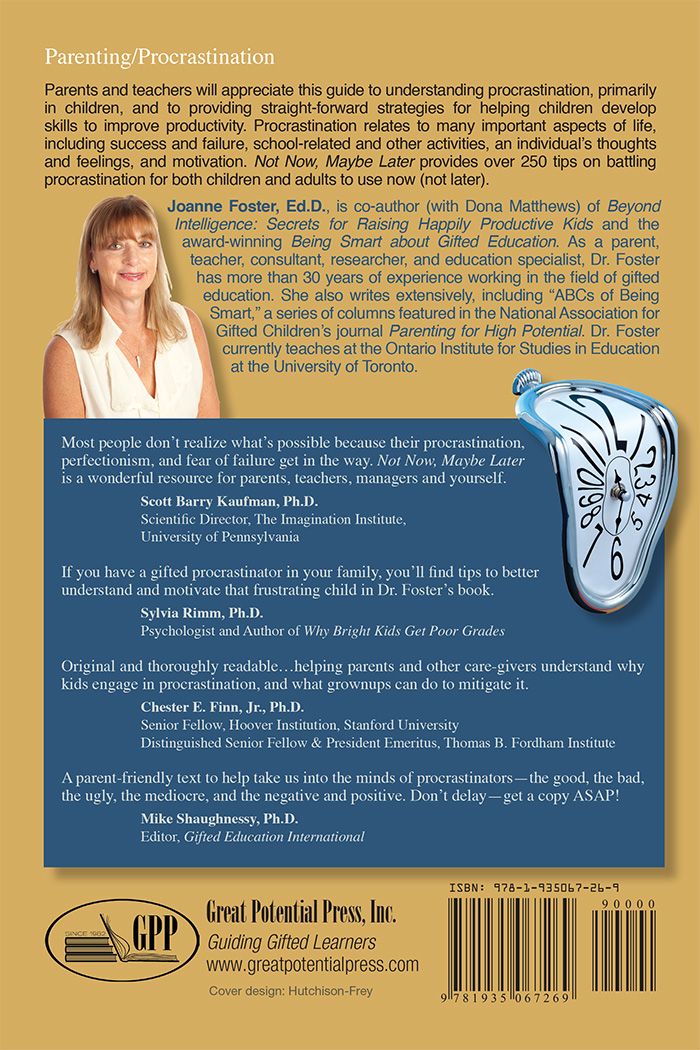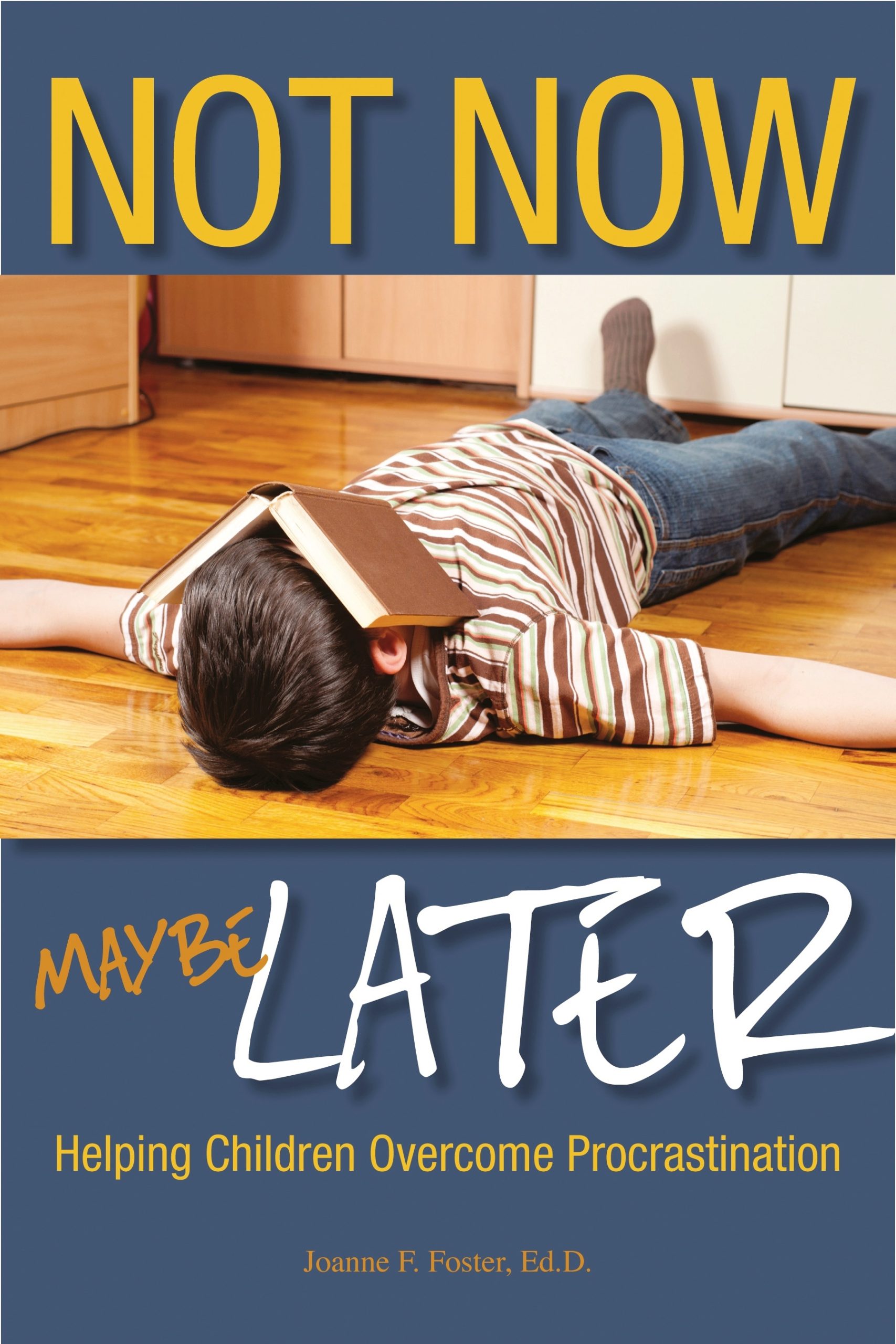Not Now, Maybe Later:
Helping Children Overcome Procrastination
BY Dr. Joanne Foster
Kids CAN overcome procrastination! Not Now, Maybe Later is the resource book adults need to encourage and support children and teens as they endeavor to become more productive. Dr. Joanne Foster shares understandings about why kids procrastinate, and what to do about it. She informs readers, empowers families, and offers loads of strategies for practical use. This interesting go-to guide will help turn ‘later’ into ‘now,’ and fortify kids’ motivation, effort, and fulfilment.
Dynamic Duo Discount: Purchase Bust Your BUTS and Not Now, Maybe Later and receive $10 off. Click here.
Not Now, Maybe Later: Helping Children Overcome Procrastination
By Dr. Joanne Foster
Published by: Gifted Unlimited
Not Now, Maybe Later is written primarily for parents and teachers. It’s a useful resource for understanding children’s procrastination, and it’s a book that readers will refer to again and again. Dr. Joanne Foster shares hundreds of tips so adults can help kids develop the skills and strategies they need to improve their productivity. Procrastination relates to many important aspects of life, such as success and failure; home, school, and community activities; a person’s thoughts and feelings; and motivation.
Not Now, Maybe Later provides information on all of this and more, including straight-forward suggestions for preventing, eliminating, and managing kids’ procrastination tendencies. Families can also read this book together, chat about the many ideas, and put the suggestions to use now, not later.
Although Not Now, Maybe Later is geared for adults, teens who read the book will be better able to understand and address their procrastination tendencies or avoidance behaviour. Moreover, Dr. Foster’s award-winning book Bust Your BUTS: Tips for Teens Who Procrastinate is a useful complimentary resource that’s also filled with hundreds of practical ideas for kids—and for adults, too! (The two books together are a Dynamic Duo for readers!)
Also available as an eBook.
Reviews for NOT NOW, MAYBE LATER:
Chester E. Finn, Jr.
Senior Fellow, Hoover Institution, Stanford University; Former United States Assistant Secretary of Education
Scott Barry Kaufman, Ph.D.
Author of Ungifted: Intelligence Redefined; co-founder of The Creativity Post; Scientific Director of Imagination Institute, University of Pennsylvania
Michael Shaughnessy, Ph.D.
Editor, Gifted Education International, Senior Editor, Education News
Lannie Kanevsky
Associate Professor, Faculty of Education, Simon Fraser University
Dona Matthews, Ph.D.
Educational consultant, award-winning author, columnist Psychology Today
Marlaine Cover
Social Entrepreneur and Founder, Parenting 2.0
Sarah Chana Radcliffe, M.Ed.
Author: The Fear Fix and Raise Your Kids without Raising Your Voice
Table of Contents
Introduction
- The focus of the book—and why people should not procrastinate reading it
Chapter 1. Is Procrastination a Way of Being or a Way of Doing?
- Reasons for procrastination
- Checklist – Procrastination thought probes
Chapter 2. Procrastination: To Do or Not to Do
- About procrastination: What is it? Who does it? Why and When?
- Procrastination personas
Chapter 3. Some Ties That Bind
- About success
- About failure
- About stress
- About self-regulation
Chapter 4. Procrastination and Child Development: Bridging Age Brackets among Young Children
- Toddlers
- Early childhood
Chapter 5. Procrastination and Child Development: Bridging Age Brackets among Older Children
- Tweens
- Adolescents
Chapter 6. School Daze and Procrastination
- Struggling – Supporting stragglers
- Average → Bright – Activating avoiders and busting buts
- Gifted – Smart beginnings
Chapter 7. Procrastination and Perfectionism
- Expectations
- Feeling overwhelmed or concerned
- Positivity
Chapter 8. Can and Able—or Not?
- About potential
- Preferences
- Making changes and taking risks
Chapter 9. Children’s Daily Avoidance
- Little worries? Big worries?
- Messiness! Chores! Homework!
- A “head” start
- Goal-setting
Chapter 10. The Five “M”s
- Mastery orientation: Challenge!
- Mindset: The effect of effort on accomplishment and ability
- Metacognitive capacities: The importance of being reflective
- Motivation: Intentions, interest, goal-setting, and personal progress
- Meaningful relationships: What matters most?
Chapter 11. Thinking It Through and Resources, Too
- More practical strategies
- Success stories and tips from those in the know
- Directions for future reference
About the Author
A Few Excerpts from the book
By Dr. Joanne Foster
(Chapter 2)
(Chapter 4)
(Chapter 3)
(Chapter 4)
(Chapter 6)

What is the target audience for this book?
Not Now, Maybe Later is geared for parents of procrastinators, and for anyone who wants to help kids understand and deal with procrastination tendencies. Teachers, psychologists, and counsellors will also find abundant strategies to assist children who put things off, have difficulty meeting expectations (their own or that of others), or exhibit avoidance behavior. Families can poke through the book together, and kids can ponder the information and the more than 250 tips that Dr. Foster provides.
What is the main focus of this book?
Not Now, Maybe Later is about procrastination, and what to do about it. How can adults help kids overcome procrastination tendencies? Dr. Joanne Foster has plenty of answers to that question! For example, she delves into children’s ways of being and ways of doing; the nature of success, failure, stress, and self-regulation; procrastination at different ages and stages of development; perfectionism; daily avoidance; how kids can get on track, and the five Ms – mastery orientation and challenge, mindset, metacognitive capacities, motivation, and meaningful relationships. Plus, the author provides resources and a wide range of suggestions that are sensible and doable.
How many pages are there in this book?
There are 197 pages in Not Now, Maybe Later.
Why is Dr. Foster qualified to have written this book?
Dr. Foster has been writing about procrastination for many years, and she has presented on the topic at numerous conferences as well. She has taught about the importance of motivation in multiple venues, including classrooms, teacher-training facilities, parenting forums, professional panels, and various other groupings. Motivation and productivity are two foundational aspects underlying Not Now, Maybe Later, and Dr. Foster has infused integral information on these two key aspects in her work spanning decades.
What supplementary resources can readers find in this book?
The book is organized in a way that informs readers, and then arms them with practical tips. Not Now, Maybe Later is about procrastination AND what to do to overcome it—with suggestions throughout. There are helpful checklists, compelling quotes, and some vivid accounts of children’s lived experiences. The reference section (pp. 165 – 71) has over one hundred useful entries, plus there is a very fulsome endnote section (pp. 173 – 187) addressing material chapter by chapter. Finally, there is a handy index with hundreds of key topics (pp. 189 – 196).
What kinds of reviews has this book received?
Reviews of Not Now, Maybe Later are very complimentary, and include the following comments: “a terrific addition to the shelf of child-rearing counsel,” and “a wonderful resource” and “offers parents and their children positive, practical insights on procrastination, what it feels like, where it comes form, and how to work through it.” One prominent reviewer says this book “establishes Dr. Foster as a premier Life Skills coach for modern parents,” another reviewer compliments her “lively engaging style,” and yet another says, “this is a book every parent will want to read!”
Are there any illustrations or charts in this book?
There are over twenty figures (or bulleted charts) in Not Now, Maybe Later, including a comprehensive checklist of reasons for procrastinating; interesting descriptors of 24 different procrastination personas; tips for finding positivity; dos and don’ts for parents; dos and don’ts for children; success stories; and many other features.
How can I see samples of the content of this book?
There is an “Excerpts” tab on the Not Now, Maybe Later book page on this website.
Is there a book club guide or other online material that supplements this book?
The material in Not Now, Maybe Later lends itself to thoughtful conversations about procrastination, and any of the chapters’ content or checklists would springboard a lively book club discussion. The extensive references and endnotes also lead readers to many supplementary resources. Plus, Dr. Foster’s book Bust Your BUTS is a “next step” and fine complement to Not Now, Maybe Later, empowering kids to take responsibility for their procrastination by understanding reasons for it, and by learning how to effectively address it.
Related Blog Posts
Kids’ Laziness: Is It Okay or Unhealthy?
Why are kids sometimes lazy? Is it problematic or restorative? Find out! Here are questions about laziness kids can ask themselves—and answer. Plus, discover next steps and useful tips to help them manage laziness, and engage in happy productivity.
Yes, I Can! 8 Ways Kids Can Confront Challenges
This blog is for kids! Discover empowering strategies, and tackle challenges confidently. This guide encourages accountability, preparation, optimism, and taking breaks to enhance creativity and success in various settings—from school to community programs.
Motivating Activities for Children
Explore a treasure trove of creative and engaging activities designed to spark children’s imaginations and foster family connections. From inventive play to artistic expression, these ideas promise enriching experiences for weekends, rainy days, and beyond.









